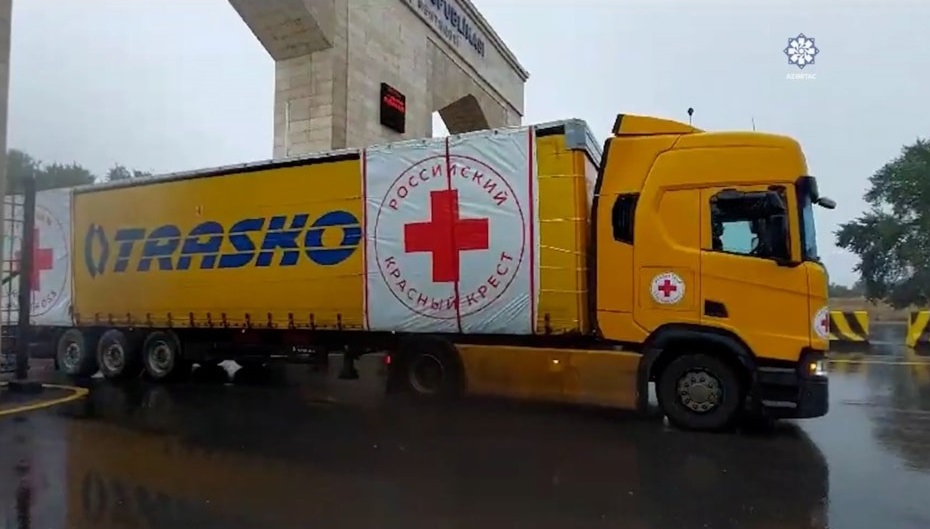Nagorno Karabach flares up again
The clashes broke out just as a convoy organized by the International Red Cross managed to reach the enclave that had been isolated for months. The military campaign launched by Baku after accusing Stepanakert of sabotage. Armenian sources already speak of 27 deaths. There is also tension in Yerevan where Prime Minister Pašinyan is in the crosshairs.
Moscow (AsiaNews) - Just as a glimmer of hope seemed to be opening in the humanitarian corridor, the situation in Nagorno Karabakh has worsened again, according to the classic pattern of the border conflict between Armenians and Azerbaijanis.
After three months of total blockade (and nine months after the start of the crisis on the Lachin corridor that connects the enclave to Armenia), 23 tons of flour and various products were finally sent through, organized by the international Red Cross with Russia and Switzerland.
At the same time, however, accusations of Armenian war sabotage also came from Baku, immediately rejected by Stepanakert as "the usual disinformation".
The National Security Service of Azerbaijan accused some armed units of entering km 58 of the Akhmedbejli-Fuzili-Shusha highway, placing an anti-tank mine that caused the death of two civilians.
Baku also speaks of four other Azeri policemen who were killed by a mine on another road, the one that leads to Gadrutsk province through the Tagavard tunnel, while the police were trying to "reach the terrorists".
Based on this, the Azerbaijani army launched an extensive military campaign in Nagorno Karabakh yesterday: military forces stormed the defense lines of the Armenian enclave while Stephanakert was targeted by artillery fire.
Armenian sources speak of 27 deaths in a few hours, including at least two civilians, and over 130 injured.
The situation is therefore getting out of hand again. The International Red Cross has expressed its deep concern about the impact of the military escalation on civilians.
"We ask all military authorities to do everything possible to protect the lives of civilians - he wrote in a note - and to respect the principles of distinction, proportionality and precaution, in line with the obligations established by international humanitarian law".
Appeals are also coming from Russia to stop and guarantee the safety of the Russian interposition forces, while the Baku defense ministry claims to have created humanitarian corridors and reception points to evacuate the population from the dangerous area, while "only military targets" would be attacked legitimate."
But - eloquently - for the Azeris the only path to peace in the region would be "the complete withdrawal of the Armenian army from Karabakh and the dissolution of the Stepanakert pseudo-regime".
The tension also reached Yerevan, where the police forces deployed to protect the government building, in anticipation of further protests by the population against the conduct considered too "submissive" of the executive led by Nikol Pašinyan, who tried to consult with Macron and Biden on ways to defuse the conflict.
All this comes after three months of stalemate, in which the roads were blocked and no solution could be found, pushing Armenia to increasingly turn elsewhere than Moscow and Baku.
The loads arriving in recent days had instead been "synchronized" from the two directions of the corridors of Lachin and Agdam, on the one hand flour and foodstuffs, on the other medicines and hygiene products of Russian and Swiss origin.
The Red Cross stressed that the blockade had been overcome "thanks to very persistent diplomatic efforts", but Azerbaijan denied that it was a "surrender of border sovereignty". It was only a "demonstration of goodwill" by the Baku government, according to the foreign ministry's declarations, while new Azerbaijani troops are massing in the area.
The Armenian director of the Center for Caucasian Studies, Ovik Avanesov, is one of the Armenian representatives who has spoken out most clearly against the opening of the Agdam route, while the Armenian population of Nagorno Karabakh only needs free access to the Lachin corridor.
For this reason the humanitarian cargoes were held back for a few days, and the episodes of sabotage would be a consequence of this conflicting interpretation of the "openings".
Avanesov believes that the sole goal of the Azerbaijanis remains the expulsion of all Armenians from the area: “the blockade will continue and humanitarian problems will not be resolved, because Azerbaijan will continue to prevent free access from all sides even after individual openings, it's their way of doing things."
If Baku obtains accessibility recognition from Agdam's side, the direct line of communication with Armenia via Lachin will remain blocked forever, according to what Armenian observers complain, not only for humanitarian cargoes, but also for trade and people.
07/02/2019 17:28







.png)










